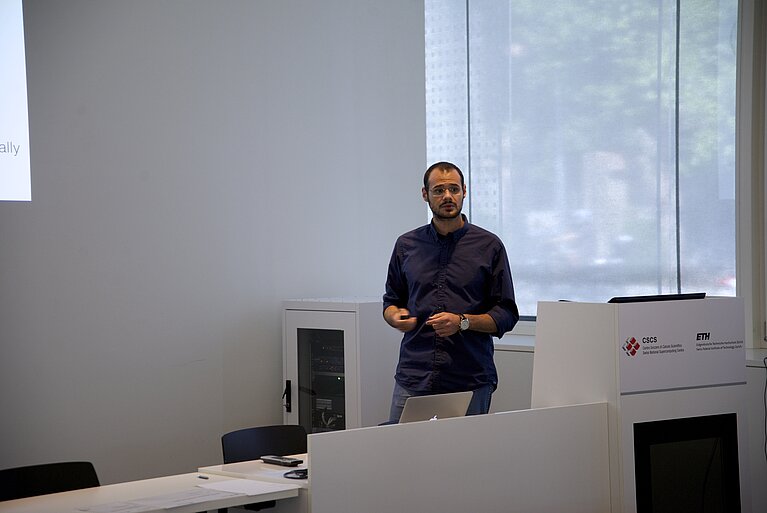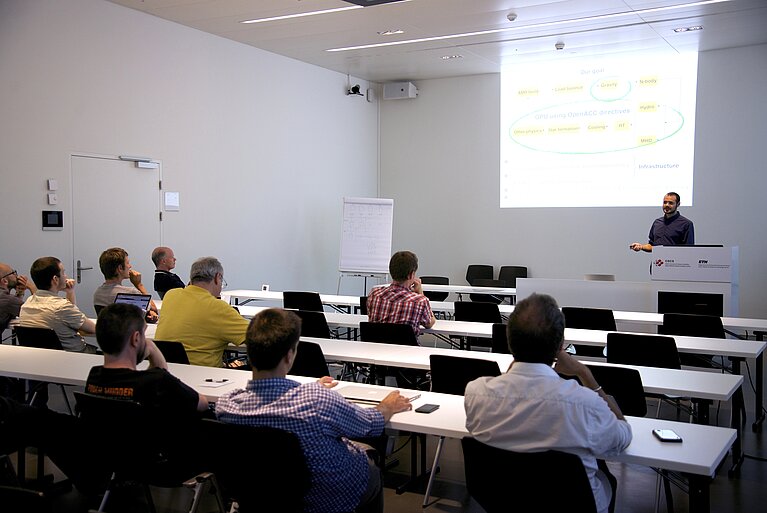June 19, 2015
CSCS offers internships at various levels and in most organizational units. We sat down with Christos Kotsalos who did a 6 month internship at CSCS since February 2015 and who told us his experience.
Could you shortly introduce yourself?
My name is Kotsalos Christos, I am from Greece and I hold a Diploma in Civil Engineering from National Technical University of Athens. The last two years I am doing the Master in Computational Science & Engineering at EPFL and from February 2015 I am an intern at CSCS under the supervision of Claudio Gheller.
What does fascinate you in the world of supercomputing?
The supercomputing world gives us the opportunity to explore and implement numerical and algorithmic theories from various scientific and engineering fields. It allows us to solve and visualize problems –impossible for the conventional computing power- that we could not deal so far. Consequently, supercomputing is essentially a digital laboratory with undiscovered aspects and stunning capabilities and this is definitely what fascinates me the most.
How did you first hear about CSCS?
I first heard about CSCS in the second semester of my studies at EPFL in the Parallel Computing and PThreads course. After that, I had the chance to discuss with some of my classmates that were already interns at CSCS.
When and for which intern position did you apply to CSCS?
I applied for the position: “Refactoring of the RAMSES code and performance optimization on CPUs and GPUs” in September 2014.
Why did you wanted to intern at CSCS?
First of all, the topic of the internship attracted me a lot, since through this project I could apply my computational background as well as my fresh knowledge on High Performance Computing (HPC). Other factors that contributed to choose CSCS for my internship are its reputation around the HPC world, its excellent facilities and the plethora of projects that is actively involved.
What project did you work on during your internship at CSCS?
The topic of my project is about RAMSES code. RAMSES aims at studying the evolution of the large-scale structure of the universe and the process of galaxy formation. It is an adaptive mesh refinement (AMR) multi-species code, describing the behavior of both the baryonic component, represented as a fluid on the cells of the AMR mesh, and the dark matter, represented as a set of collisionless particles. The goal of my project is the acceleration and optimization of RAMSES exploiting both CPUs and GPUs.
How would you describe a regular day as intern at CSCS?
The day usually starts around 7:45 and ends around 17:00. Generally, my project is directly linked with the supercomputing facilities (Piz Daint), where I have to implement and test various algorithms and optimize their performance. The working environment at CSCS is warm and friendly and so, besides the time that we spend in front of the computers, there is the possibility for fruitful discussions with the other members of CSCS.
How do you like to work in Lugano?
Lugano is a place that combines the city characteristics with nature. It is a really small and picturesque place where one can walk in few minutes from the city centre to the beautiful lake. Close enough are the mountains that offer various activities for the nature enthusiasts -I am one of them-. I enjoy my daily life at Lugano as well as the communication with the locals. Definitely, it is a place that I would choose to live and work in the future.
What will you take home from this experience?
CSCS is at the forefront of the High Performance Computing, where one can use the latest tools and experiment on fascinating and complex scientific, engineering and computational subjects. As a result, this period at CSCS filled me with unique experiences that helped me evolve as a Computational Scientist and this is the most important thing to take home.


